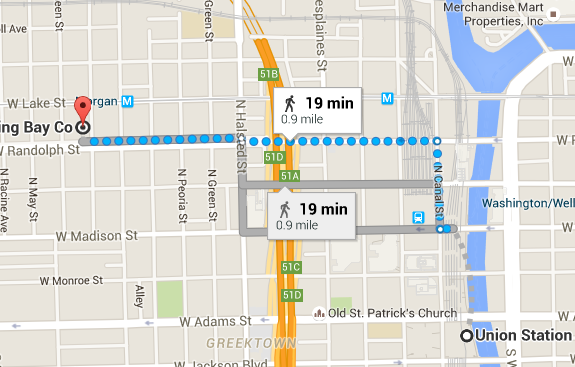"The Next River North"
Haven’t you heard? Chicago’s “Fulton Market” neighborhood has become the hottest neighborhood for tech companies, restaurants and startups alike! Warehouse timetables have been plastered over by scrum boards. Loading docks have been repurposed into grandiose restaurant facades. The raw smell of fish has been supplanted by the toasty aromas of indie coffee shops. The meatpackers are gone - the hackers are here.

Well…Not so fast.
While real estate developers have been placing bets on Randolph Street like it’s an over-sized craps table, it doesn’t mean you should start packing up the office ping-pong table just yet. After all, this isn’t Chicago’s first hyped-up real estate narrative. Whatever happened to the rebirth of Motor Row? And what was all that fuss about the tallest building in the world?
While there has been no shortage of encouraging developments to suggest the Fulton Market is poised to become the next great creative-office submarket, the truth of the matter is, the jury is still out.
Between a Train and a Hard Place
A major component of River North’s success in attracting tech companies, including the younger employees more likely to live in the city, lies with the accessibility to Red and Brown Line CTA stations. While proponents of the Fulton Market are quick to point to the new Morgan Green Line station, anyone who has actually experienced Green/Pink Lines, can attest to how utterly infrequent these trains run. Perhaps this will change once some of the larger companies set up shop, but for the time being, 10-15 minute standing times are a reality.

Perhaps the #1 hang-up for those considering the Fulton Market is accessibility to Metra stations. According to Google Maps, the walk to 1K Fulton from Union Station clocks in at 19min (.9 miles). Suburban commuters must be prepared to make an extra transfer…or pony up for a Divvy Bike pass.
Driving from the suburbs has also become an issue. Street parking in most areas has all but disappeared, and if River North is any future indication - don’t expect dedicated parking to get any cheaper.
Dollars Per Square Foot
According to commercial real estate services firm CBRE Inc., average asking rental rates for Class C office space (think traditional timber loft) within the Fulton Market has reached $22.43 per square foot. A relatively modest discount compared to the average $26.44 per square foot in River North.
What’s even harder to swallow, Class A office space (think 1K Fulton) within the Fulton Market is going for a whopping $39.50(!) per square foot, which is approaching the highest price point over the entire Chicago market. To put further into perspective, Willis Tower, one of the most iconic and high-end properties throughout the Midwest, is asking comparable rates for space between the 2nd and 7th floors.

In a recent YouTube video highlighting the up-and-coming neighborhood, Paul Reaumond, Senior Vice President of CBRE concedes, “if you're looking for more traditional polished office space, you could be spending anywhere in the mid-thirties to forty dollars a square foot which would put you in the upper end of pricing in downtown Chicago.”
The Great Unknown
For a submarket so new that its exact borders have yet to be universally defined, it’s not surprising relocating to the Fulton Market has often been referred to as “a leap of faith.” Now, take into consideration Rahm Emmanuel’s record-breaking real estate tax hike, and the leap becomes more of a cannonball into a crowed public pool. While it’s true that landlords ultimately pass off tax increases to tenants, regardless of submarket, the Fulton Market’s already volatile prices may raise extra cause for concern.

Thanks to tight supply and historically steady demand, River North has proven to be a relatively safe bet as far as committing to a long-term lease. However, a downturn in the market could expose the Fulton Market’s current price points, which have yet to ever be tested. There is virtually zero historical data to forecast what may happen to prices in a downturn. Tenants who sign a lease today may find themselves locked in at 15-20% above a post-recession market.
Conclusion
Don’t take this the wrong way: The Fulton Market is the hottest market in Chicago. Nobody can point to signs of investors or developers slowing down. Nobody can deny several high-profile companies have already taken the “leap of faith.” But until the Googles, SRAMs and Sandboxes of the world are able to test the waters, a little skepticism is only natural.



